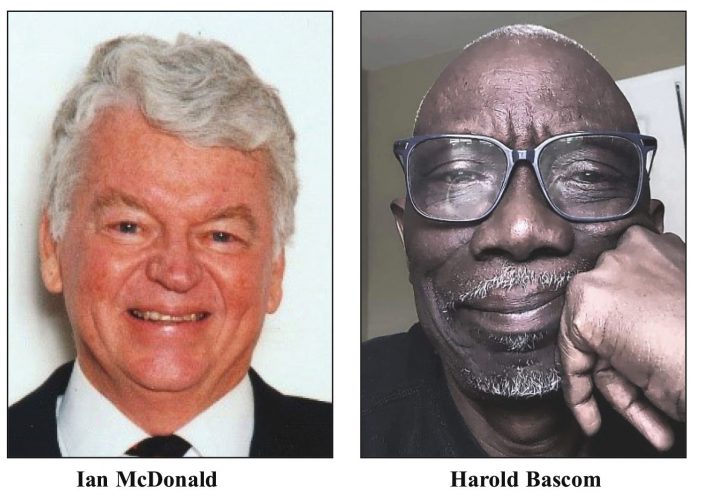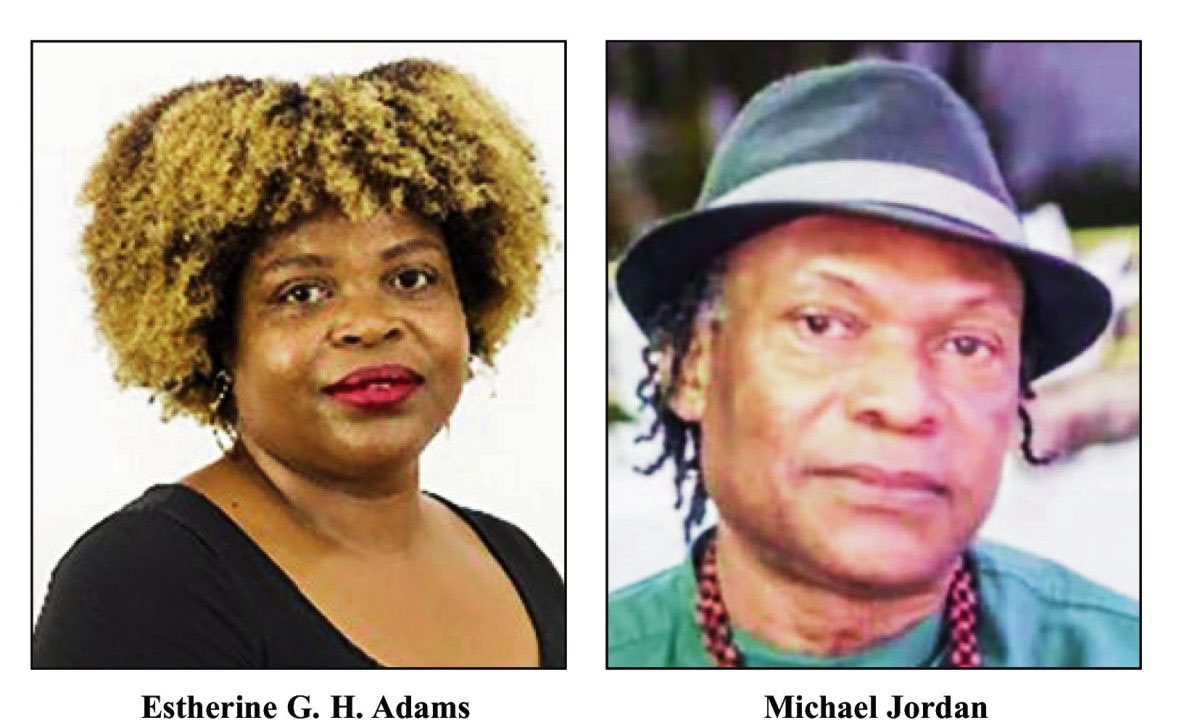The 2023 Guyana Prize for Literature awardees were last night announced at the 2024 festival, honouring outstanding works in fiction, poetry, drama, non-fiction, and youth categories.
In the fiction category, the top three winners were Kennard Ramphal for “Slippery Ochro” in 3rd place, Somnauth Narine for “Rage from the Backwaters” in 2nd place, and Michael Jordan for “Girl in the Pink Pleated Skirt” in 1st place.
In the Poetry category, Ruth Osman takes home the Best First Book of Poetry award for “All Made of Longing” while Ian McDonald won Best Overall Book of Poetry for “Not Quite Without a Moon.” Sasenarine Persaud secured 3rd place with “Mattress Makers.”
For Drama, Harold Bascom’s “Unfounded” clinched 1st place, with Shaphan Hestick’s “With a Kiss” in 2nd place and Jamal La Rose’s “Requiem for the Living” in 3rd place.

Youth Awards were also presented, with Renika Anand winning 1st place in the Girls Poetry category for “Lotus Flower Story: The Woman” and Samir Mohamed earning 1st place in the Boys Short Story category for “The Lighthouse at the Bottom of the Sea.”
The event was marked by encouraging words from head Juror, Professor Evelyn O’Callaghan, who emphasized the importance of reading poetry and continuously improving writing techniques.

Jordan’s citation said: The first-person narrator of this novel is emotionally and mentally invested. He combines the art of investigative journalism with the skills of a passionate amateur detective to unravel the political and police corruption that had caused the official investigations of the horrific murders of young Guyanese girls to go cold. In having the courage and folly to follow the clues to their logical conclusion, the narrator fulfils his life-long promise to unmask the identity of the person behind the dastardly murder of the girl in the pink pleated skirt. The writing is confident, the dialogue is appropriately modulated to convey Guyanese urban culture, and the characters, both the incidental and central, come alive in the orchestrating hand of Michael Jordan.
Adams’ citation said: The core argument of Estherine Adams’ book is that the prison in British Guiana in the period after Emancipation in 1838 was fundamentally a tool for controlling the labour of the non-white population of the colony. She writes that “the local government and the plantocracy leveraged the expansion of the colony’s prisons not to control crime, per se, but to control labour.” Both freed Africans and indentured labourers were subject to the whims of magistrates who were ready to convict and collaborate with the plantocracy in order to create a prison population to serve as a source of unpaid and enforced labour. Adams shows that women inmates were significant contributors to the plantation economy in this way, though their forced work has been almost completely unrecorded by modern historians. Adams’ research is comprehensive and her book will be the main text on the subject of the incarceration of women in British Guiana, essential to all future researchers. It is both original and meticulously documented.
Osman’s citation said: The title foregrounds the theme of longing, particularly for freedom to rise above conformity to the norm of “proper” female conduct, that runs like a thread through these poems. As noted in the Forward, this is a woman’s voice, a woman engaged with the lifelong project of making and remaking herself.
We also welcomed the wry self-reflective examination of the writing process, and noted the haunting presence of a Caribbean history of suffering and fire. Osman is comfortable with local language and imagery (“the light/sterile as a reptile’s stare” 19), and even in her darker poems is not averse to a witty lightness of touch. All in all, this is a collection of accomplished and elegant works in a strong and controlled poetic voice.
McDonald’s citation said: Another late work by a poet still on top of his craft. The collection is moving and varied, a strong and well-rendered selection of writing. The poems are exquisite and poignant – piercing through time to cherished memories of his childhood and strong sense of belonging to Guyana (“Place of worship”, “Forest at Night”). There is something wondrous in the way McDonald manages to mine the mundane, the everyday and find glory in it.
Some of the simple portraits of ordinary Guyanese men and women (cricket fans and their commentaries, “Mrs Mathews” and her love of poetry, sugar workers in a rumshop discussing what they will use their bonuses to buy) evoke deep emotion in the reader, as do the matter-of-fact thoughts on aging and the defiant assertion of joy, friendships, beauty and above all, love.
Bascom’s citation read: A melodrama with an active plot that seeks to tackle issues of national concern. The plot is well-developed, the action engaging and characters interesting. The action of this play is set in the context of: a) rumors of an imminent invasion of the country by a hostile neighboring state; b) the experience of frequent electricity blackouts and c) historical ethnic divisions, particularly between Indians and Africans in the country. The play asks the question whether the crisis of invasion can bring about national unity?
In its approach to this question, we believe the play needs a better balance of responsibility between the races and to avoid the reinforcement of stereotypes. To its credit, however, the play shows the positive outcome and possibility of racial integration. The story signals hope in racial unity as consistent with the courage of personal choice. The action tells us, further, there is no hope for national unity or even personal evolution without enduring the pain of self-reckoning.
A release issued by the Ministry of Culture, Youth and Sport follows:
PRESS RELEASE
MCYS Honours Guyanese Writers at 2023 Guyana Prize Ceremony
(March 2nd, 2024) – The Ministry of Culture, Youth and Sport (MCYS) proudly announces the awardees of the 2023 Guyana Prize for Literature, celebrated at the awards ceremony held at the National Cultural Centre on Friday.
The Guyana Prize was established in 1987 by the late President Desmond Hoyte to recognise and celebrate outstanding literary works by Guyanese writers across various categories.
This year’s ceremony recognised authors in fiction, drama, poetry, and creative non-fiction.
The full list of awardees includes:
Best Fiction
1st Place: The Girl in the Pink Pleated Skirt by Michael Jordan
2nd Place: Rage from the Backwater by Somnauth Narine
3rd Place: Slippery Ochro by Kennard Ramphal
Best First Book of Poetry
1st Place: All Made of Longing by Ruth Osman
Overall Book of Poetry
Best Overall Book of Poetry
1st Place: Not Quite Without a Moon by Ian McDonald
2nd Place: All Made of Longing by Ruth Osman
3rd Place: Mattress Maker by Saisenarine Persaud
Best book of Non-Fiction
1st Place: The Few Among the Many: Women’s Labour in British Guiana’s by Estherine G.H. Adams
2nd Place: A Powerful Indian Voice: Alice Bhagwandai Singh; Reflections on her Work in Guyana by Baytoram Ramharak
3rd Place (tie): Iris De Freitas Brazao: Legal Luminary and Trailblazer by Joanne Collins-Gonsalves 
3rd Place: The Pedagogy of Action: Small Axe Fall Big Tree by Nesha Z. Haniff
Best of Drama
1st Place: Unfounded by Harold A. Bascom
2nd Place: With a Kisa by Shaphan A. Hestick
3rd Place: Requiem for the Living by Jamal La Rose
(The Youth Awards)
Best Poetry for Girls
1st Place: Lotus Flower Story: The Woman by Reneka Anand
2nd Place: Yellow Cheese Pencil for a Vegan Artist; Untold Stories of an Artist by Angel Moore
Best Poetry for Boys
3rd Place: Shadows in the Sand by Samir Mohammed
Best Short Story for Boys
1st Place: The Lighthouse at the Bottom of the Sea by Samir Mohammed Fiction:
Minister of Culture, Youth and Sport, the Honourable Charles Ramson Jr. during his remarks reaffirmed government’s commitment to protecting and nurturing the talent of literary writers in Guyana.
He stated that the reintroduction of the Guyana Prize was a deliberate decision made by government to promote development with the literary sector.
“It was a deliberate decision that we made because we knew we wanted to protect that space for everyone who had that love, passion and needed the safety of expression of their craft and an environment to grow and prosper,” Minister Ramson underscored.
Minister Ramson further explained that adding the youth category was a means of providing a platform for young writers to develop their skills along established writers.
The Ministry remains committed to the drama sector, providing funding for plays based on award-winning literary works. Revenue generated from these plays will be directed to the directors and performers.
The MCYS stays committed to implementing initiatives aimed to create a sustainable and organic environment to develop the literary arts of Guyana.
The ministry extends its heartfelt congratulations to all the awardees for their significant contributions to Guyana’s literary heritage. Their dedication and creativity continue to inspire and enrich the nation’s vibrant cultural landscape.






